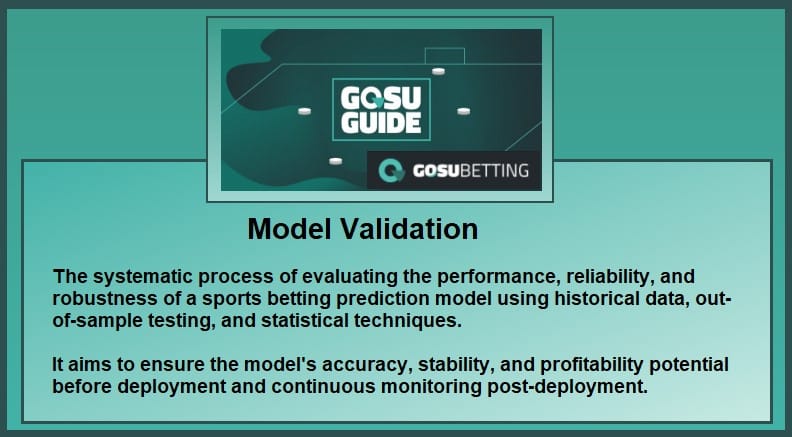In the quest for profitable sports betting strategies, building effective models is just half the battle. It is also crucial to ensure that a model is robust, accurate and reliable and that it actually works as intended. This robustness is achieved through model validation.
What is Model Validation in Sports Betting?

Model validation is a systematic process of assessing a model’s accuracy, reliability, and generalizability, by testing it on new data. This will require a clear model assessment using proven techniques.
Model validation helps to determine whether a model is fit for purpose, and that it is not just performing well by chance or is over-fitted to a specific dataset. It is an essential part of any sound predictive approach and a core check of overall model evaluation.
Model Evaluation and Performance Metrics
Model evaluation involves assessing a model’s performance and identifying strengths and weaknesses. It is an overall performance assessment completed using a variety of evaluation metrics and diagnostic tools to assess the model’s effectiveness.
Model evaluation helps to understand how effective the model is and will help in further steps to improve it.
The Role of Backtesting
Backtesting allows a model to be tested using historical data. This can be achieved with out of sample testing or in sample testing.
These aspects of historical performance assessment are useful to see how the model would have performed in the past plus to give us an indication of how well the model will perform in the future. This exercise forms a core part of retrospective analysis.
Predictive Performance and Forecasting Accuracy
A key goal of any model validation process is to understand how well the model will perform in the future.
Predictive performance looks at a model’s ability to accurately predict future outcomes using metrics such as forecasting accuracy.
We are also assessing the overall prediction quality using a range of techniques.
A robust model validation approach provides confidence in a model’s predictive performance.
Accuracy Metrics: Quantifying Performance
Accuracy metrics, also known as performance metrics, are the quantitative tools that are used to measure the quality of a model’s predictions.
We must understand error rates and other forms of statistical accuracy, as well as overall validation scores to assess the success of a model and to measure the overall model accuracy. We also want to assess the types of error measurement that we are experiencing in the model.
This provides a precise way to measure a model’s performance and to compare the performance of various techniques.
Statistical Significance
Statistical significance helps us to understand the results by showing that results are not due to random chance or noise and are likely to be genuinely useful.
These techniques are essential for validating findings. They rely on assessing results using significance testing which also makes use of randomness tests to assess the robustness of a model and to create an overall robustness check. The resulting data gives us a set of validation statistics that allow us to interpret our results.
The use of statistical significance adds scientific validity to the model and allows for a greater level of confidence.
Out-of-Sample and In-Sample Testing
Out-of-sample testing uses unseen or hold-out data to test the model. The approach relies on splitting the data, such as when a data-splitting strategy is used. Likewise, in-sample testing looks at the performance of the model on the data that was used to train it.
This provides insight into how well a model will perform in real-world scenarios. Out-of-sample testing offers information on generalization performance and the external data set, while in-sample testing offers insight into data fitting and training performance in a way that includes an assessment of the training accuracy.
Model Generalization: Real World Performance
Model generalization looks at the model’s ability to perform on new, unseen data. This provides out of sample reliability and gives an insight into prediction generalization of the model, allowing for an assessment of overall robust performance and transferability. It shows us the overall broad applicability of the model.
Model generalization is a key factor in determining how much confidence you can have in your model when deployed.
Model Calibration for Accuracy
Finally, model calibration is the process of fine-tuning the model to ensure it performs at its best. This relies on parameter adjustment and parameter estimation. The process is also used to perform overall model optimization and data fitting to improve results and may involve techniques such as algorithmic optimization.
Summary and Key Takeaways
In summary, model validation is the essential step that transforms a promising model into a reliable and trustworthy tool for sports betting.
By testing its performance, identifying any weaknesses and constantly improving the overall accuracy, model validation provides the edge that bettors need to be truly successful.
The key takeaways to be aware of around model validation include:
- Assuring Reliability: Model validation is a test of reliability and accuracy of the models.
- Real-World Performance: Understanding model validation is essential for understanding how a model performs with real-world data.
- Avoiding Overfitting: Model validation helps prevent models from being overly tuned to specific datasets.
- Gaining Confidence: Improves trust in predictions and overall trading strategies.
- Continuous Improvement: Helps to identify and rectify deficiencies, and to iteratively improve models over time.
By focusing on a robust approach to model validation, sports bettors can move beyond guesswork and build models they can actually rely on when navigating sports betting markets in search of strong bets.
If you’ve already validated a model you’ve created and are ready to put some predictive conclusions into practice, these GOSUBetting recommended crypto sportsbooks below come highly recommended after extensive testing:
Top Bitcoin Betting Sites
BC.Game
Welcome Bonus: Four-part deal up to $1,600
18+ – Gamble responsibly – GambleAware.org – T&C’s apply




